Reviewing Equestrian Canada’s Financial Statements isn’t a high priority for many, so we’ve sifted through it all and come up with a few key takeaways.
Equestrian Canada’s 2020 financial statement revealed a loss of $95,180. While it’s better than what they had anticipated, it comes on the heels of a $50,474 loss in 2018 and generally doesn’t indicate a good trend for the national federation. In fact, EC has lost over $795,000 since 2015.
Following are some areas of EC’s finances that the industry should be holding the board to account for:
Discipline Budgets
Jumping, Dressage, and Eventing committees have all confirmed that they have not received a budget since 2019. They have not been provided a 2020 budget nor a revised Covid-19 budget.
These volunteer committees are made up of each sports’ most senior experts. They are meant to develop policies and programs to help educate and develop our athletes, but this is impossible without a budget to guide them. These volunteers are extremely frustrated with EC for their lack of cooperation and transparency and feel that their time and effort as volunteers is not valued.
“The previous committee structure used to compliment and support EC staff, but that’s no longer the case,” commented Mike Lawrence who resigned from Category A in part from frustration with how little EC leadership works with the industry. “Committee members now feel frustrated and ignored and wonder why they should spend many hours in meetings if their suggestions are going to be disregarded.”
An anonymous insider commented, “In my 25 years with the organization, I have never been as ill-informed as to its activities than I am today. Everything is done in secret, with zero communication. And that’s exactly how they want it, with no one to question them. EC seems to forget that it is a government-funded, not-for-profit organization that IS answerable to its stakeholders.”
EC notes that they have had to manage budgets in the face of the pandemic and the associated loss of revenue. They also note that the budget is monitored by senior management which includes Yves Hamlin, CEO, John Wightman, CFO, Rachel Huebert, James Hood, Douglas Duncan, Kristy Laroche, and Marilyn Korim. The concern raised by many of the sport’s leaders, however, is that there isn’t a single discipline manager or equestrian expert among them.
Former EC board member and reigning Canadian Show Jumping Champion Beth Underhill is among those concerned by the insular nature of the EC leadership.
“This disconnect is particularly concerning since neither the CEO nor the High Performance Director have any experience in the horse industry. The lack of equestrian knowledge could be overlooked if there was more of a culture of collaboration with industry experts who populate the various committees and have decades of experience. Stakeholders assume that the operational committees [editor’s note: such as Jumping, Dressage, or Eventing committees] have significant input in areas of their expertise, but this is often not the case. This has become a source of frustration among committee members who feel that their time and professional skillsets are undervalued.”
Restricted Funds
This is money collected from the industry in support of discipline-specific initiatives. Competitors are now accustomed to seeing a $7 to $20 levy on all entry fees which are collected on the understanding that they will be re-invested back into their respective discipline. Levies fund various discipline initiatives such as hosting clinics, travel assistance, scholarships, venue development, safety equipment and more that are all born out of the restricted funds budget. There is a very clear breakdown of how the money paid into the Jumping levy, for example, is spent – 50% goes to high performance, 40% goes back to the provincial hunter/jumper associations, and 10% goes towards hunter/jumper programs.
In 2019, however, EC changed from restricted funds to deferral accounting and no longer provides updates on the balance of these funds. The 2019 EC Annual Report noted that the board was tasked with developing a policy, but this has yet to materialize.
EC’s 2018 financial statements noted that the restricted funds balance was $1.9 million and EC has confirmed that the “total reserve fund balance remains unaffected and continues to be maintained,” however, leadership has refused to share any specific updates with the disciplines. Having been through years of inadequate financial reporting, the disciplines don’t feel comfortable allocating money for programs until they are certain of the balance.
“A proposed EC Reserve Fund Policy is currently under development,” noted an EC spokesperson. “The proposed EC Reserve Fund Policy has been reviewed by EC’s Finance and Audit Committee and will be further reviewed by the EC Operational Committees for feedback. No further information concerning the reserve funds will be shared at this point in time.”
Event Budget
The events budget had an eye-popping $187,061 (645%) increase over 2019 to $216,072 largely due to the annual convention which was held at The Royal Agricultural Winter Fair which went well over budget.
EC remarks that the “original budget for the 2019 Convention and RAWF was $130K; however, through organization-wide department collaboration, a decision was made to accommodate additional events at RAWF to promote stakeholder collaboration and save on expenses that would have occurred if those events had been held independently of one another.”
Indeed, the Meeting and Travel budget did decrease significantly ($350,704 or 41%), however, some might question the wisdom of an organization hosting a $130,000 event that had previously been successfully held for $30,000. Particularly when said organization has been losing significant sums of money.
Inventory
EC has not proven to be an effective retailer. After having written off $120,000 worth of inventory in 2019, the Cost of Goods in 2020 was $20,700 more than Product Sales.
“EC is evaluating its product offerings in a continued effort to ensure stakeholder needs are supported appropriately and efficiently,” commented an EC spokesperson.
If you feel so inclined, you can download your own copy of EC 2020 Financial Statement here and the 2020 Financial Statement Report here.
It’s important for industry participants to understand where their sport license dollars are going. It’s equally as important that EC be more transparent about financial matters with the discipline committees who know first-hand what programs are needed. It’s time for the national federation to be held accountable, and that starts with transparent accounting.
Do you have questions? Feel free to ask us – info@horsesport.com
Ask the Discipline Chairs:
Jumping – Karen Sparks – JumpingCommittee@equestrian.ca
Dressage – Victoria Winter – DressageCommittee@equestrian.ca
Eventing – Ruth Allum – EventingCommittee@equestrian.ca
Or EC Board President – Meg Krueger – president@equestrian.ca
The Latest










